The LDA Podcast: An Exploration of Evidence-Informed Approaches to Learning and Development
Originally spearheaded by noted learning scientists and consultants, Will Thalheimer and Matt Richter, and originally called Truth In Learning, the updated, upgraded, and rebooted LDA Podcast explores all aspects of the Learning and Development field- validated tools and resources for better training, debunked learning models, controversies in the industry, and so much more. Now hosted by Matt and Clark Quinn (another noted scientist and consultant, the podcast will dive deeply into what makes learning and development more effective and beneficial for its end-users, stakeholders, and practitioners. Along with our monthly and general episodes, we will also offer a monthly series on AI, hosted by AI expert, Markus Bernhardt. Over the upcoming season, The LDA Podcast will: -- Keep you current with L&D research and innovations -- Unpack complex ideas and concepts -- Sharpen your critical thinking skills -- Stimulate your L&D grey cells (although this objective may not be evidence-based) N...
Episodes
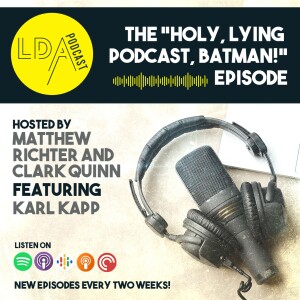
Thursday Dec 28, 2023
Thursday Dec 28, 2023
This episode’s topics: Is AI cheating? What is the impact on intellectual property? Learner assessment? Heck, even job replacement? These questions are both philosophical and pragmatic. What about the value of critical thinking... and does AI take that application away? We explore ways to use AI more effectively... but recognize we cannot even fathom some of the consequences, yet.In the spirit of Christmas and Santa Claus, is it ok to ever lie to your learners? What is the value of the "white lie?" What is fiction in the context of learning? Is it a lie? How do we use or adapt case studies? We discuss the more nuanced, ethical questions related to the truth in the context of learning.Joining Matt and Clark is Karl Kapp. Karl is a professor of instructional technology and the Director of the Institute for Interactive Technologies at Bloomsburg University. He is also the founder of the Learning and Development Mentor Academy where he offers tons of self-paced workshops and live sessions for seasoned L&D professionals. He also co-founded Enterprise Game Stack, a company that designs, develops and delivers online, digital card activities and games that keep participants focused, engaged, and collaborative, while reinforcing learning both in the moment and over time. You can find Karl on LinkedIn here: https://www.linkedin.com/in/karlkapp/ And on his website here: https://karlkapp.com Episode Notes:Matt refers to the book, Everybody Lies: Big Data, New Data, and What the Internet Can Tell Us About Who We Really Are by Seth Stephens-Davidowitz. https://www.amazon.com/Everybody-Lies-Internet-About-Really-ebook/dp/B01AFXZ2F4/ref=sr_1_1?crid=32XE7RFU8662&keywords=Everybody+lies&qid=1703693836&sprefix=everybody+lies%2Caps%2C98&sr=8-1 Karl refers to Damned Lies and Statistics by Joel Best. https://www.amazon.com/Damned-Lies-Statistics-Untangling-Politicians/dp/0520274709/ref=sr_1_1?crid=1NIS0ITNOKV1A&keywords=lies%2C+damned+lies%2C+and+statistics&qid=1703693953&sprefix=Lies%2C+damned+li%2Caps%2C92&sr=8-1 Clark refers to Cognitive apprenticeship: Teaching the crafts of reading, writing, and mathematics by Allan Collins, John Seely Brown, and Susan E. Newman. https://psycnet.apa.org/record/1989-98135-013Scott Page wrote The Model Thinker: What You Need To Know To Make Data Work For You. https://www.amazon.com/Model-Thinker-What-Need-Know-ebook/dp/B07B8D3V9V/ref=sr_1_1?crid=12ZCGDWY9C3GI&keywords=The+Model+Thinker&qid=1703694035&sprefix=the+model+thinker%2Caps%2C98&sr=8-1And, Scott is from the University of Michigan.
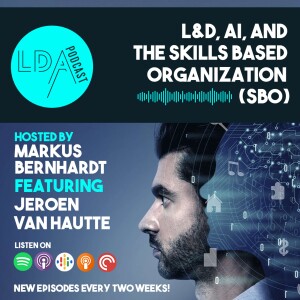
Thursday Dec 14, 2023
Thursday Dec 14, 2023
In this episode, Markus and Jeroen van Hautte dive into the world of AI and L&D, but with a specific view towards the future of the Skills Based Organization (SBO). Jeroen shares his views on the future of work, the impact AI is going to have, and how it all fits in with the skills piece - in L&D, in HR, and in the wider organization.Jeroen is the co-founder and CTO of TechWolf, an AI start-up revolutionizing workforce skill management for global clients like Booking.com, GSK and United Airlines. A top graduate of Cambridge University, he's recognized by Forbes '30 Under 30' for his contributions to AI and mentorship in engineering. As an advisor and thought leader, he maintains a strong connection to research while steering TechWolf's product vision and fostering an inclusive, customer-driven engineering culture.You can find Jeroen and TechWolf on LinkedIn here:Jeroen: https://www.linkedin.com/in/jeroenvanhautte/TechWolf: https://www.linkedin.com/company/techwolf/ TechWolf's website is: https://techwolf.com/Two more links referred to in the show are:A guide to building a resilient ecosystemA guide to building the foundations for your skill-based organisation
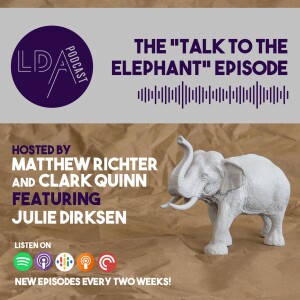
Thursday Nov 30, 2023
Thursday Nov 30, 2023
Clark and Matt are joined by instruction design guru and all around fantastic human, Julie Dirksen. Julie has been in the business for over 15 years creating highly interactive and more importantly, highly effective eLearning experiences for clients all around the world. But, Julie is more than that! She is one of the those go-to people in the industry. She is an expert that many other experts in our industry turn to and call a researcher translator. Meaning she digs into core issues… practical issues, in the work learning practitioners do. She figures out what the research says, and then puts it into succinct, useful bites that are immediately applicable. Her first book, DESIGN FOR HOW PEOPLE LEARN is one of those rare books in L&D that broke out and became a best seller beyond the industry. It is the go-to book for designers and trainers. Today, Clark and I get to talk with her about latest book, TALK TO THE ELEPHANT, DESIGN LEARNING FOR BEHAVIOR CHANGE. We talk about systems thinking and how the system can affect the factors that influence how and why one behaves as one does. We explore the individual factors such as motivation, incentives, and environmental factors. And more! As Clark will say in the episode, TALK TO THE ELEPHANT is a wonderful complement, a companion, to DESIGN FOR HOW PEOPLE LEARN. We originally planned to talk with Julie for just 20 minutes, One hour later… we were still going and felt like we could go on forever. Julie also joins us at the end for Best and Worst. You can find Julie at: https://usablelearning.com.Julie rattles off so many models and tools throughout the show, we recommend you simply buy the book to get more on each, as well as their respective references. For the links she directly references, here they are:The change ladder survey link is on the book page:https://usablelearning.com/elephant/ Julie’s "best" was Casey Fiesler. Her video on Fair Use is here:https://www.youtube.com/watch?v=D2PuntvfN20 Casey has a shorter version here that skips the wolf-themed erotica: https://www.youtube.com/watch?v=FuDEgnxkGDg) The syllabus for her tech ethics course on tiktok is here:https://docs.google.com/document/d/1tWdqYqYBHARbZXFQX4cybe88S-0twqvUu1xLhYnLgU4/edit?usp=sharing
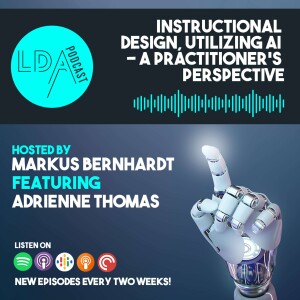
Thursday Nov 16, 2023
Thursday Nov 16, 2023
In this episode, Digital Creator and Instructional Designer Adrienne Thomas takes us on a personal journey through the AI tools landscape, from the front line perspective of an experienced practitioner. Adrienne shares with us her personal journey, how she deploys AI tools in her day to day work and the value she derives from them, as well as her experiences from the courses she delivers where she introduces others to these tools and their applications.You can find Adienne here: https://digitalwisdom.life and on LinkedIn: https://www.linkedin.com/in/adwthomas/.Her course, coloring book and AI coaching is included on her linktree.Here are the links referenced in the episode:Gamma App: A new medium for presenting ideas, powered by AI. Create beautiful, engaging content with none of the formatting and design work.- https://gamma.app/Pictory's powerful AI enables you to create and edit professional quality videos using text, no technical skills required or software to download: https://pictory.ai/Animoto: https://animoto.com/Canva is a free-to-use online graphic design tool. Use it to create social media posts, presentations, posters, videos, logos and more: https://www.canva.com/Midjourney: https://www.midjourney.com/Linktree: https://linktr.ee/ourdigitalwisdom
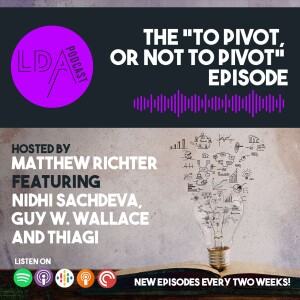
Thursday Nov 02, 2023
Thursday Nov 02, 2023
In this episode, we offer up three independent segments. Matt Richter is joined first by Nidhi Sachdeva. Nidhi is both an evidence-based learning designer and a researcher. She just completed her PhD in the spring, and the two talk about the differences between learning and performance. Then, Guy Wallace is in the house. Guy needs no introduction, having been a performance analyst and instructional architect for a few decades now. We talk about his latest book, The L&D Pivot Point, published by LDA Press. Finally, in our third segment, the inimitable Thiagi joins Matt for a new series we will intermittently run called “A Person of Interest.” Thiagi shares his biography… his story with us.You can find Nidhi most easily on LinkedIn here: https://www.linkedin.com/in/nidhi-sachdeva-toronto/, or her blog with Jim Hewitt here: https://scienceoflearning.substack.com Guy can be found here: https://eppic.biz/guy-w-wallace-2/ And, Thiagi here: https://thiagi.com. Nidhi references the work of Paul Kirscher, John Sweller, and Richard Mayer and their article, Why Minimal Guidance During Instruction Does Not Work: An Analysis of the Failure of Constructivist, Discovery, Problem-Based, Experiential, and Inquiry-Based Teaching. You can find it here: https://www.tandfonline.com/doi/epdf/10.1207/s15326985ep4102_1?needAccess=true Matt & Nidhi refer to the cognitive architecture and instructional design when discussing complex skills. He references the Sweller, van Merrienboer, and Paas article from 1998: Cognitive Architecture and Instructional Design found here: https://link.springer.com/article/10.1023/A:1022193728205 They also deviate and start talking about SDT (Self-Determination Theory), and you can learn more about that here: https://selfdeterminationtheory.orgAnd, Matt wrote an article about SDT in the context of learning found here: https://ldaccelerator.com/lda-blog-1/open-the-motivational-door-and-let-the-learners-in-and-keep-them The 85% Rule for Optimal Learning can be found here: https://www.nature.com/articles/s41467-019-12552-4 Scott Rigby and Richard Ryan, Glued to Games: How Video Games Draw Us In and Hold Us Spellbound. https://psycnet.apa.org/record/2012-01778-000 Guy’s book, The L&D Pivot point can be purchased here: https://ldaccelerator.com/the-ld-pivot-point Thiagi studied with Albert Elsen. Here’s more info about him: https://honorsandawards.iu.edu/awards/honoree/1453.html BEST AND WORST REFERENCES:Daniel Willingham Tik Tok on the fallacy of rereading for studying. Ok… there are a ton of Tim Tok videos by Dan. We aren’t sure exactly which one she referred to, but after going through several to find it, we recommend the whole darn Willingham channel. It’s great. https://www.tiktok.com/@daniel_willingham
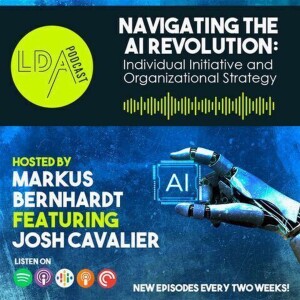
Thursday Oct 19, 2023
Thursday Oct 19, 2023
In this episode, Markus and Josh delve into the transformative impact of Artificial Intelligence on both organizations and individual professionals. They emphasize the urgency for individuals to proactively engage with AI technologies, particularly in the fields of education and corporate training. The discussion also navigates through the ethical and strategic complexities that accompany this technological shift. Tune in to gain insights into how individual initiative in AI adoption could be a decisive factor in career and organizational success.Links referred to or promised in the episode: Classes https://go.joshcavalier.com/masterclass Patreonhttps://www.patreon.com/JoshCavalier 150+ Prompts for Educationhttps://www.joshcavalier.com/150Prompts YouTubehttps://www.youtube.com/@joshcavLinkedIn: https://www.linkedin.com/in/joshcavalier/
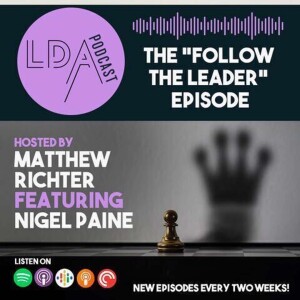
Thursday Oct 05, 2023
Thursday Oct 05, 2023
In this episode, podcast host, Matt Richter is joined by Nigel Paine, organizational learning and leadership expert. Together, they spend the whole episode exploring that nebulous and vague concept of leadership. They fail to definitively lock in a definition for leadership— thus demonstrating one of the inherent challenges organizations face when leveraging LD programs. But, more importantly, they look at what we can do, when we effectively develop leaders within organizational contexts. Leaders are all about managing… managing the context. No one style, approach, model, theory, or consultant prescription will work in all scenarios… of at all. So, what is one to do? Focus on flexibly adapting and managing that aforementioned context. Recognize that that there are so many different perspectives— the leaders, the followers, other players, etc. And then find ways to accept and leverage those different perspectives.In other words, leadership is utterly founded on adaptation and change. It is about systems thinking. To paraphrase Keith Grint, leadership is all about working to solve those wicked problems we face.Nigel answers the question about how we can predict or forecast whether someone will be a good leader. Which then leads to a discussion of how we conceive of leadership in our culture and how we describe leadership success.Below are some references and notes from the show:We referenced both Barbara Kellerman and Jeffrey Pfeffer:Kellerman, B. (2012). The End of Leadership. New York: Harper Collins. Kellerman, B. (2015). Hard Times: Leadership in America. Stanford, CA: Stanford University Press. Pfeffer, J. (2015). Leadership BS: Fixing Workplaces and Careers One Truth at a Time. New York, Harper Business. Matt mentioned some of the Warren Bennis and Burt Nanus management comparisons reference: Young, M., & Dulewicz, V. (2007). Similarities and Differences between Leadership and Management: High-Performance Competencies in the British Royal Navy. British Journal of Management, 19(1), 17-32. doi:https://doi.org/10.1111/j.1467-8551.2007.00534.xAnd the book from them is LEADERS: Strategies for Taking Charge.Nigel mentioned John Kotter. Here are two references that sum up his work nicely.Kotter, J.P. (2001) What Leaders Really Do. Harvard Business Review. December 2001.Adapted from A Force for Change: How Leadership Differs From Management (pp. 3–8), by J. P. Kotter, 1990, New York, NY: Free Press. General Electric’s Crotonville Leadership Institute was actually opened in 1956, not in 1947, as Nigel stated. We referred to Keith Grint and his article:Grint, K. (2005). Problems, problems, problems: The social construction of ‘leadership.’ Human Relations. 58 (11), 1467-1494.The originators of wicked and tame problems: Rittel and Webber.Rittel, H.W.J. and Webber, M.M.. (1973) Dilemmas in a General Theory of Planning. Policy Sciences. 4, pp. 155-169.Peter Senge and The Fifth Discipline. You can find the book anywhere books are sold.Winston Churchill. There are a ton of biographies about Churchill. Matt’s favorite’s are the William Manchester volumes. Neville Chamberlain reference: Self, R. (2013, September 30). Was Neville Chamberlain Really a Weak and Terrible Leader? Retrieved from http://www.bbc.com/news/magazine-24300094.Tina Kiefer— and others— on the drawing a Leader exercise: https://www.nytimes.com/2018/03/16/health/women-leadership-workplace.html?smid=url-share Joseph Devlin: https://www.linkedin.com/posts/joseph-t-devlin_learningstyles-brainmyth-activity-7113156889688854528-RFWZ?utm_source=share&utm_medium=member_desktop

Thursday Sep 21, 2023
Thursday Sep 21, 2023
In this episode, Markus and Chris Pedder, Chief Data Scientist at OBRIZUM, discuss the rise and utility of large language models (LLMs) in L&D, including their limitations, as well as ethical concerns.
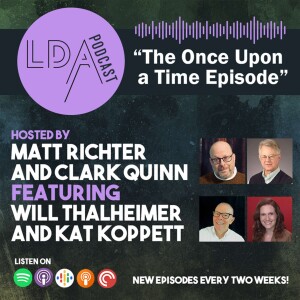
Thursday Sep 07, 2023
Thursday Sep 07, 2023
In this episode, we reboot the Truth in Learning podcast. After catching up with Will Thalheimer, and introducing Clark Quinn, we give a brief update on the direction of the show. We then explore the question, "What should every CEO know... care about... concerning learning and development?" In fact, Will will share some of his recent insights into the topic based on his new and upcoming book.Folks can find Will at https://www.worklearning.com/.Learn about his upcoming book here: https://www.ceosguide.net/Then, Kat Koppett, renowned expert on applied improvisational theater techniques and storytelling, joins the conversation with Matt and Clark. Together, they explore what is meant by storytelling in the context of learning, and learning and development. They discuss some of the academic and research disciplines that are foundational to applied storytelling, referencing psychologist Jerome Bruner, cultural theorist Mieke Bal, applied researcher Roger Shank, and others. You can find Kat at: https://www.koppett.com/.Finally, the team brings back the best and the worst-- where hosts and guests share their best and worst observations in the industry.

Tuesday Nov 17, 2020
Tuesday Nov 17, 2020
In this episode (recorded on September 29, 2020— the day of the first US Presidential debate) we are joined by our friend, Gary DePaul, PhD. We explore:LeadershipLeadership development The current state of leadership development in L&DWhether we should even bother to invest in it.And a ton more.We start with a deep dive debating the definition of leadership and its Rorschach-like characteristics. Then, we bring up that old chestnut as to the differences between management and leadership. Gary proposes a unique slant on this conundrum.Matt links the discourse of leadership in business more concretely to history and politics.The discussion navigates through semantics, leadership semiotics, and the effect definitions have on practical issues in leadership discourse. We argue the roles, responsibilities, and practices of leadership. And, of course, we debate the how, the why, and the what of leadership development. Gary referenced Mary Parker Follette. You can learn more about this American social worker and management consultant here.Matt references James MacGregor Burns. You can learn more about this historian here.Matt references Peter Northouse and his book, LEADERSHIP: THEORY AND PRACTICE. Will keeps bringing up the practical side of the issue (an excellent point in the discussion)… what do leaders do? Who leads and who follows? What are the roles of followers? And, can we develop toward those functions? We discuss several tropes in the field, such as, “Everyone can lead,” “Everyone should lead,” and “Everyone can be taught to lead.”The guys relate the issues of reliability and validity as they pertain to leader training.Matt references the book, LEADERSHIP BS, by Stanford professor, Jeffrey Pfeffer, sharing several findings that stipulate leadership development is hugely invested in, but either poorly measured or measured as ineffective. You can find the book here.Will shares a literature review, arguing against Matt’s premise. Leadership Training Design, Delivery, and Implementation: A Meta-Analysis by Christina N. Lacerenza, Denise L. Reyes, and Shannon L. Marlow, Dana L. Joseph, and Eduardo Salas. You can find it and purchase it here.Matt tells of Ronald Reagan’s storytelling as a leadership technique. The reference for that is THE INVISIBLE BRIDGE: THE RISE AND FALL OF NIXON AND THE RISE OF REAGAN by Rick Perlstein.Matt’s book referenced is THE LEADERSHIP STORY: A NEW MODEL FOR LEADERSHIP (ePub version). Or, the Kindle Version here.We refer to several studies on the perception of women in leadership roles. A summary of those studies with embedded links is in this New York Times article.Of course, Will brings up the issues around measurement and evaluation.Finally, we end the episode briefly digging into what is ethical leadership, as well as courageous leadership.We have also put together a list of references and resources. CLICK HERE. The list is by no means exhaustive and complete. It is a set Matt uses in his program, The Leadership Development, Development Workshop. Due to time constraints in the episode, we skipped The Best and the Worst this round.Our guest, Gary, is an author, speaker, and leadership consultant with Gary DePaul Consulting. With more than 20 years of practitioner and academic experiences in performance improvement, Gary helps elevate the performance of individuals, teams, and organizations. His areas of practice include leadership development, organizational evaluation, speaking events, workshop facilitation, and executive coaching. He can be found at: https://www.garyadepaul.comGary has written several books worth reading.WHAT THE HECK IS LEADERSHIP AND WHY SHOULD I CARE? NINE PRACTICES OF 21st CENTURY LEADERSHIP: A GUIDE FOR INSPIRING CREATIVITY, INNOVATION, AND ENGAGEMENTTHE MOST EFFECTIVE AND RESPONSIBLE CLINICAL TRAINING TECHNIQUES IN MEDICINEGary is also the moderator, along with our friend, Guy Wallace, of HPT Treasures, an blogging site with tons of HPT practitioners providing monthly articles. Both Will and Matt are contributors, as well. You can find it here.

Your Title
This is the description area. You can write an introduction or add anything you want to tell your audience. This can help potential listeners better understand and become interested in your podcast. Think about what will motivate them to hit the play button. What is your podcast about? What makes it unique? This is your chance to introduce your podcast and grab their attention.
